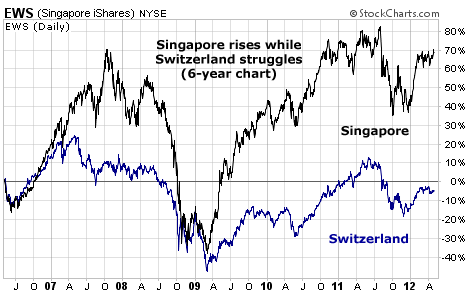| Home | About Us | Resources | Archive | Free Reports | Market Window |
|
Editor's note: Today, we're continuing our series on important books with our friend Mark Ford, editor of The Palm Beach Letter. Mark started with no money. He was the son of a teacher – one of many children. He built a multimillion-dollar fortune himself... And you'll find one of his favorite books on building wealth below... The Door to America's Millionaire Club Is Not LockedBy
Thursday, May 3, 2012
"Contrary to popular modern belief, it is still quite possible for the successful individual to make his million – and more."
J. Paul Getty wrote these words in 1960, in his book, How to Be Rich. It's as true now as it was then... and Getty shows his readers that anyone with the right mentality can get rich by developing a handful of habits.
Getty was a very rich man. I've heard it said that in today's dollars, his wealth was greater than Bill Gates' and Warren Buffett's put together.
Getty made his fortune by buying up oil businesses at bargain prices just after the depression. A small portion of the book is devoted to telling this story. The rest of it presents his thesis: that anyone with the right mentality can get rich by developing a handful of habits.
How to Be Rich is very easy to read. Written as a series of essays for Playboy magazine, it feels like a casual conversation with a very rich friend.
"Although there are no sure-fire formulas for achieving success in business," Getty says, "there are some fundamental rules to the game, which, if followed, tip the odds of success very much in the business man's favor."
Those rules include:
The book is loaded with practical advice for business owners and employees who want to share in the profits of their businesses.
How to Be Rich also has a chapter devoted to passive investing. Most people don't realize it, but Getty's record as a buyer of stocks was stellar. What was his strategy? To buy great companies with distinct competitive advantages when their shares are cheap.
Sound familiar?
Another chapter talks about real estate. Getty was a big believer in real estate as a secondary investment and made millions that way. He also talks about investing in fine art. In the course of his business life, Getty acquired one of the greatest private collections of art in his time. He left much of that collection to various museums, including the Getty Museum in Malibu, California.
What I like about this book – besides the fact that Getty has come to the same conclusions on wealth-building that I have – is that it is extremely motivational. There is something about the way he writes that feels authentic. (As opposed to Donald Trump, for example.) When you have the world's richest man giving you advice on getting rich, you want to listen.
That said, a few of his ideas might be surprising to some readers. For example, Getty is famous for pinching pennies... But he believed in paying his employees well and letting his best employees get wealthy by sharing in the profits. He was not condescending to his employees. He treated them like partners.
The most successful business people I know share this view.
Another contrarian idea: Getty disputes the idea that the business owners should think big and take big chances. His success, he says, came from "thinking small" (i.e. paying attention to details) and avoiding risk at every juncture.
If you have ambitions of being truly rich one day, you should read How to Be Rich. If you have already read it once, you should read it again and again.
Best,
Mark Ford
Further Reading:
Mark has written a number of books under the pen name Michael Masterson. Get two of our favorites here...
Discover how to double your business' profits easily, and design powerful marketing campaigns to outsell your competitors.
Learn how to develop wealthy habits, get richer while you sleep, and retire early. You will also find out how to create a three- to 15-year plan to become a millionaire.
Market NotesASIA UP, THE WEST NOT SO MUCH: BANKING EDITION We're going to the bank for this week's third installment of "Asia up, the West not so much."
To recap the idea, it concerns the gradual increase of Asian economic power... and the gradual decrease of old European economic power. Many European countries have declining population growth and onerous business regulations. This creates a headwind against the region's stock and real estate prices. Many Asian countries have healthy population growth and are embracing free markets. This creates a tailwind behind the region's stock and real estate prices.
Yesterday, we presented our "travel edition" of this idea by displaying the performance of Thai assets (representing Asia) versus Spanish assets (representing Europe). Today, we look at two popular banking destinations. One is Singapore, which has become an elite global financial hub over the past few decades. The other is Switzerland, a European banking hub that is waning in power, along with the continent.
Below is a six-year chart that plots the performance of the Singapore investment fund (aka EWS, the black line, up 70%) versus a popular Swiss investment fund (aka SWZ, the blue line, down a bit). Mind you, these countries have their own individual dynamics to consider, but the "big idea" is valid: Asia is gaining on old Europe.
 |
In The Daily Crux
Recent Articles
|


